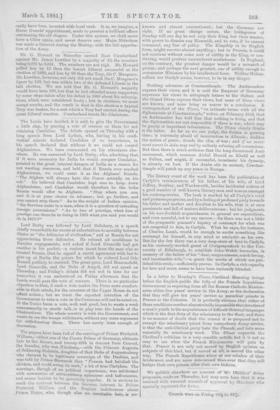The literary event of the week has been the publication
of Carlyle's reminiscences of his father, of his wife, of Lord Jeffrey, Southey, and Wordsworth, besides incidental notices of a good number of well-known literary men and women amongst his contemporaries. The book is marked by all Carlyle's vivid and picturesque genius, and by a feeling of profound piety towards his father and mother and devotion to his wife, that is at once passionate and full of mature deliberateness ; but his judgments ' on his non-Scottish acquaintances in general are supercilious, and, even scornful, not to say narrow,—for there was not a little of the pragmatic peasant's bigotry of contempt for what was not congenial to him, in Carlyle. What he says, for instance, of Charles Lamb, would be enough to excite something like contempt for himself, in any mind as unelastie as his own. But for the few there was a very deep store of love in Carlyle, as his curiously-worded grant of Craigenputtock to the Uni- versity of Edinburgh, to establish John-Welsh bursaries, in memory of. the father of his "dear, magnanimous, much-loving, and inestimable wife,"---a grant the words of whieh are pub- lished this week,—sufficiently proves. In Carlyle, a rich capacity for love and scorn seems to have been curiously blended.


































 Previous page
Previous page